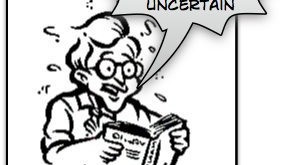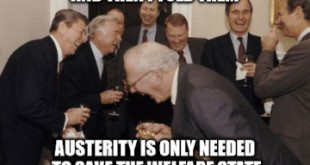Signs economists haven’t the foggiest Unlearning economics has a nice post up “outlining the major reasons why economists can be completely out of touch with their public image, as well as how they should do ‘science,’ and why their discipline is so ripe for criticism.” He presents a list of 18 common failings encountered time and time again in discussions with mainstream economists: 1. They refer to the idea that “all models are simplifications” as if this somehow creates a fireguard...
Read More »Empirical ‘validation’ of macroeconomic models
Empirical ‘validation’ of macroeconomic models Modern macroeconomics is characterised by a search for the microeconomic foundations of macroeconomics, and it follows a very specific path. This search for microeconomic foundations follows a hypothetico-deductive approach … It involves starting with an axiomatic system and deducing conclusions from it … The model and the conclusions of the reflection cannot produce predictions that can subsequently be confirmed or refuted. A more flexible...
Read More »Postmodern economics? No thanks!
Postmodern economics? No thanks! Despite its considerable oeuvre, postmodern criticisms of economics are doomed to shrivel and be absorbed by mainstream economics … Social theory, unlike thermodynamics, is condemned to remain untestable, and stuck in the realm of opinion. Economics valiantly attempts to extricate itself from this fate with a touching commitment to mathematics but, sadly, it only ends up as a religion with equations. Postmodernity errs in thinking of this as the inevitable...
Read More »Reconsidering ergodicity and uncertainty
Reconsidering ergodicity and uncertainty The concept of fundamental uncertainty is a centerpiece of much of Post Keynesian economics. The foundation of this concept in Keynes’s own work and in broader intellectual foundations and considerations has generated much debate and discussion in recent decades, most recently between Rod O’Donnell (2014-15) and Paul Davidson (2015). We have reviewed their arguments, finding some grounds for O’Donnell’s criticism of Davidson’s claim that rejection...
Read More »Why not just face it — austerity does not work
Why not just face it — austerity does not work When an economy is already hanging on the ropes, you can’t just cut government spendings. Cutting government expenditures reduces the aggregate demand. Lower aggregate demand means lower tax revenues. Lower tax revenues means increased deficits — and calls for even more austerity. And so on, and so on. How was it possible, it has to be asked, for the basic Keynesian insights and analyses to be so badly lost in the making of European economic...
Read More »The ‘journal game’
The ‘journal game’ Many of the submissions do not appear to be written in order to further economic knowledge. Whilst I fully understand the pressure on authors, particularly young academics, it is still disheartening that so many economists seem to be playing the ‘journal game’, i.e. producing variations on a theme that are uninteresting and which do not enlighten. John Hey (Managing Editor of The Economic Journal) Sad to say, if anything, things have gotten even worse since Hey wrote...
Read More »‘New Keynesianism’ — little new and nothing Keynesian
‘New Keynesianism’ — little new and nothing Keynesian Not that long ago, Paul Krugman had a post up on his blog discussing ‘New Keynesian’ macroeconomics and the definition of necoclassical economics: Most of what I and many others do is sorta-kinda neoclassical because it takes the maximization-and-equilibrium world as a starting point or baseline, which is then modified — but not too much — in the direction of realism … New Keynesian models are intertemporal maximization modified with...
Read More »Nationalekonomiska föreningens årsmöte 2016
Nationalekonomiska föreningens årsmöte 2016 [embedded content]
Read More »The most important book in the history of economics
The most important book in the history of economics [embedded content]
Read More »What mainstream economists are embarrassed to admit
What mainstream economists are embarrassed to admit The true state of affairs is almost opposite of what Friedman makes it out to be when he ventures the opinion that “different predictions about the importance of so-called ‘economies of scale’ account very largely for divergent views about the desirability or necessity of detailed government regulation of industry and even of socialism rather than private enterprises.” Was there ever an economist who came to believe in either socialism or...
Read More » Heterodox
Heterodox








